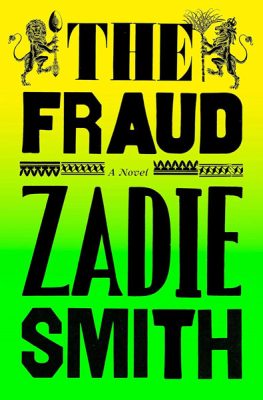Zadie Smith’s Debut Novel Has Some Bite
Review An assessment or critique of a service, product, or creative endeavor such as art, literature or a performance.
 By Michael Malone
By Michael Malone
Zadie Smith is having a pretty good November. She had an essay in The New Yorker, in which she shared the harrowing yet humorous account of her falling out of a bedroom window in London as a teen and landing 30 feet below.
This week, her novel “The Fraud,” about a 19th century criminal trial where a man was accused of impersonating a nobleman, turned up on The New York Times Ten Best Books of the Year.
As I’ve not yet read “The Fraud,” I will share some thoughts about a Smith novel I did read: “White Teeth.” The book came out in 2000 and was nothing short of a smash.
Smith was just 24 when “White Teeth” was published. It tells the story of two unlikely friends in London whose friendship dates back to World War II. Archie Jones is on his second marriage, to a young Jamaican woman. Samad Iqbal, from Bangladesh, has an arranged marriage and twin sons.
Archie’s Italian wife left him and he attempted to gas himself to death in his car, but is interrupted. With a new view on life, he ends up at a New Year’s Eve party and meets the Jamaican woman, Clara, who becomes his wife.
The novel begins with Archie’s suicide attempt. Smith writes, “Archie Jones didn’t want to die in some pleasant, distant woodland, or on a cliff edge fringed with delicate heather. The way Archie saw it, country people should die in the country and city people should die in the city. Only proper. In death as he was in life and all that. It made sense that Archibald should die on this nasty urban street where he had ended up, living alone at the age of forty-seven, in a one-bedroom flat above a deserted chip shop.”
And so Archie leans back in his Cavalier Musketeer Estate, on a dismal street called Cricklewood Broadway, and awaits his demise.
Samad is Muslim, but strays from his moral compass with incessant masturbation, an affair and drinking lots of beer at a local Irish pub alongside Archie. In an effort to instill Muslim beliefs in his offspring, he sends his 10-year-old son Magid to Bangladesh, without telling the boy, his wife or Magid’s twin brother Millat.
No one is happy with the move.
Magid and Millat end up leading very different lives in their respective countries. Magid grows to be an atheist and Millat a womanizing thug.
Samad is not all that psyched to be a father. As Smith introduces him, she writes, “Children. Samad had caught children like a disease. Yes, he had sired two of them willingly – as willingly as a man can – but he had not bargained for this other thing. This thing that no one tells you about. This thing of knowing children. For forty-odd years, traveling happily along life’s highway, Samad had been unaware that, dotted along that road, in the creche facilities of each service station, there lived a subclass of society, a mewling, puking underclass. He knew nothing of them and it did not concern him.”
Things change when Samad has kids, and his kids bring their kid friends over, and his friends bring their kids over, and Samad’s house, and world, is inhabited by kids.
“White Teeth” was very well-received. “An astonishingly assured debut, funny and serious, and the voice has real writerly idiosyncrasy,” said none other than Salman Rushdie. “I was delighted by White Teeth.”
The Atlanta Journal-Constitution called the book “a magnificent and audacious novel, jam packed with memorable characters and challenging ideas.”
The GoodReads ratings for “White Teeth” are more down to Earth. The book has averaged a 3.79 out of 5, with some 153,000 readers weighing in. A very good score, but not quite great.
I did not enjoy this book as much as I’d hoped to. Smith has tons of talent, and that she created such a big, bold novel at age 24 is even more remarkable. As creative as her prose is, I felt the story meandered, and would’ve been well-served by a tighter edit. It goes for 448 pages, and it felt like it went for 448 pages. Maybe more.
If “White Teeth” sounds a little too big to tackle, you can read The New Yorker story about Smith’s tumble out of the window. It is insightful and funny. She was 17 and infatuated with Prince. Her name was Sadie, not Zadie. She stole a Silk Cut cigarette from her mother and sat on the windowsill, smoking, when she fell.
“Though I told anybody who asked that I’d fallen out of my bedroom window ‘smoking a fag,’ I don’t think anyone really bought that, either,” Smith writes. “It didn’t make sense as a story, so it just sort of sat there lumpenly as a fact about me, albeit a fact that fit pretty neatly with the rest of my reputation as a petulant klutz who was always doing something off key and faintly ridiculous.”
Journalist Michael Malone lives in Hawthorne with his wife and two children.

Examiner Media – Keeping you informed with professionally-reported local news, features, and sports coverage.
